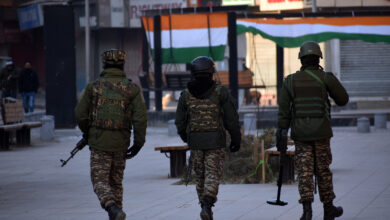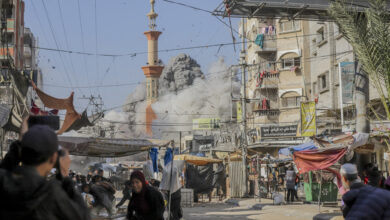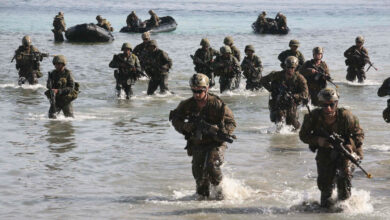ISIS claims double bomb attack on Philippines church that killed at least 18
At least 18 people were killed when a Catholic church was hit by a double bomb attack on a southern Philippine island that is a stronghold of Islamist militants on Sunday, January 27, the military said, days after voters backed expanded Muslim self-rule in the region.
A powerful first explosion occurred inside as Mass was being celebrated in the Cathedral of Our Lady of Mount Carmel in Jolo in the Catholic-majority nation’s restive south.
Shortly afterwards, a second explosion outside apparently targeted troops who were rushing to help the wounded in the smoking and heavily damaged church on Jolo, which is overwhelmingly Muslim.
It is one of the deadliest bomb attacks to strike the insurgency-plagued southern Philippines in years, and shows the violence in the region is not over despite recent steps toward peace, experts said.

Five soldiers, a member of the coast guard and 12 civilians were among the dead, regional military spokesperson Lieutenant Colonel Gerry Besana said.
At least 82 people were injured, including 65 civilians, 15 soldiers and two coast guard members, the Armed Forces of the Philippines West Mindanao Command (WestMinCom) said. By 6 p.m., 18 casualties had been evacuated from Sulu to Zamboanga city by air ambulance.
Regional police chief Graciano Mijares put the toll slightly higher at 20 dead, lower than a figure of 27 he gave initially.
The second bomb was left in the utility box of a motorcycle in the parking area outside the church, a military report said.

There have been at least 10 attacks against or near the cathedral since 2000, Rappler reported.
ISIS claimed via its Amaq propaganda agency that”two martyrs of the Islamic state carried out a double suicide attack.” In a statement, ISIS claimed the first detonated an explosive belt near the entrance to the church and the second detonated an explosive belt in the parking area.
WestMinCom said that based on CCTV footage, the Abu Sayyaf-linked Ajang-Ajang group carried out the bombing.
“There’s been long time that we are receiving information that [Abu Sayyaf] with a foreign terrorist in the area are planning to do bombing in an urban or populated area,” said Brigadier General Divino Rey Pabayo, commander of Joint Task Force Sulu, ABS-CBN reported.
“When you talk about terrorism in Sulu, the primary suspect is always the [Abu Sayyaf] but we are not discounting the possibility that there are other perpetrators,” Besana told AFP.
Misinformation and intelligence failures: How the Philippines underestimates ISIS
Abu Sayyaf’s links to ISIS
The remote island of Jolo is a base of the Abu Sayyaf, which is blamed for deadly bombings, including one on a ferry in Manila Bay in 2004 that claimed 116 lives in the country’s deadliest terror attack.
Abu Sayyaf is network of militants formed in the 1990s and is among armed networks based in the strife-torn region of Mindanao. It has earned millions of dollars from banditry and kidnappings-for-ransom, often targeting foreigners.
In 2014 some Philippine groups pledged allegiance to ISIS leader Abu Bakr al-Baghdadi, including senior Abu Sayyef commander Isnilon Hapilon and the Bangsamoro Islamic Freedom Fighters. In the following years, more groups pledged allegiance, including the Maute group.
In February and March 2016, ISIS’s Al Furat Media released videos of Hapilon and commanders from several other groups pledging allegiance to Baghdadi.
ISIS upgraded its East Asia region, including the Philippines, to an official wilayat, or province in July 2018.
Most of known jihadi stars that fled Marawi before the final crackdown in October 2017 are thought to be here. That includes Malaysian Amin Baco, suspected of being the Wali for the Islamic State forces in East Asia.
— Paweł Wójcik (@SaladinAlDronni) January 27, 2019
Peace spoilers?
Abu Sayyaf is not part of the decades-long peace process with the nation’s largest separatist group, Moro Islamic Liberation Front, that culminated January 21 with the resounding approval of a new Muslim-led Bangsamoro autonomous region in the south, which sparked hopes of quelling long-time separatist violence.
MILF condemned the attack, saying it would support efforts to apprehend of the perpetrators.
“This criminal act has no place in our civilized society especially that we are about to reap the fruits of our struggle with the ratification of Bangsamoro Organic Law,” Mohagher Iqbal, chair of the MILF Peace Implementing panel said in a statement published on the group’s website.

“Just because the [referendum] has passed does not mean that things are going to get better overnight,” said Gregory Wyatt, director for business intelligence at PSA Philippines Consultancy.
“There are still militant groups that will continue to be active and pose a security threat,” he told AFP.
Rebels and the government in Manila hope the new Bangsamoro area will finally draw the investment needed to pull the region from the brutal poverty that makes it a hotspot for radical recruitment.
The proposal gained overwhelming support in a large portion Mindanao, but Sulu province, which includes Jolo, voted against it. The area will still be part of the Bangsamoro.
The Commission on Elections proclaimed the Bangsamoro Organic Law ratified on January 25 and it is to be submitted it to President Rodrigo Duterte and to Congress. Further votes are to be conducted to determine the additional provinces that will join the Bangsamoro Autonomous Region in Muslim Mindanao.
The timing of Sunday’s bombs raised questions on whether the attack was meant to derail the peace process.
Mujiv Hataman, a regional leader in the Philippines south, said the blasts highlighted the urgency of implementing the peace law.
“I hope the [law] is implemented well so it could be a solution to stop the spread of terrorism,” Hataman told AFP.
National Security Adviser Hermogenes Esperon said “extremist criminals” plotted the bombings.
“We will not allow them to spoil the preference of the people for peace,” Esperon said. “Peace must prevail over war.”
Passport to jihad: European foreign fighters joining ISIS in the Philippines
With reporting from AFP. This post was updated to include the ISIS statement.












